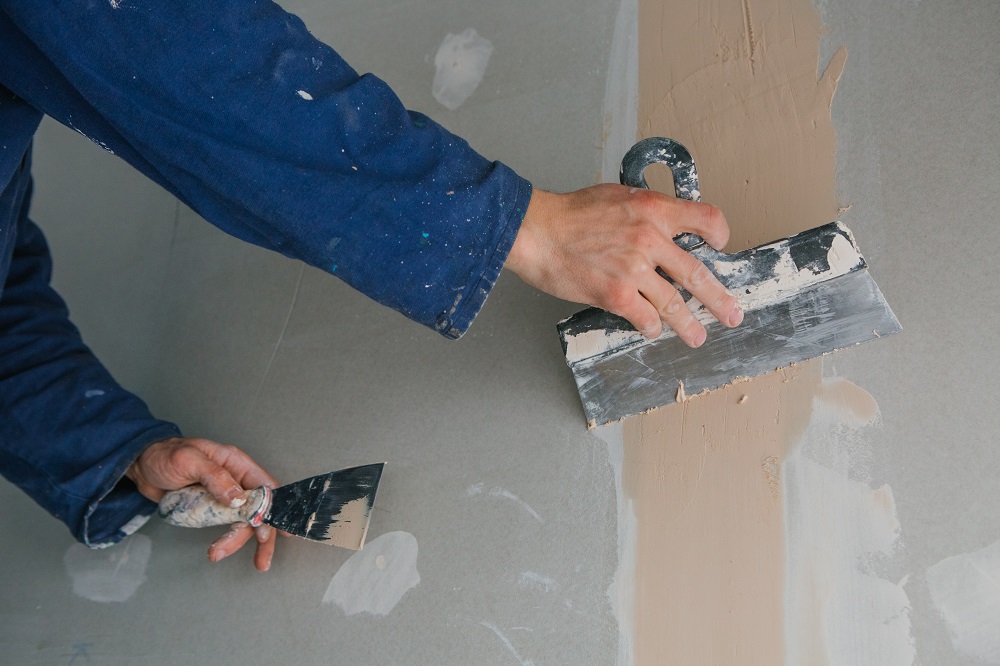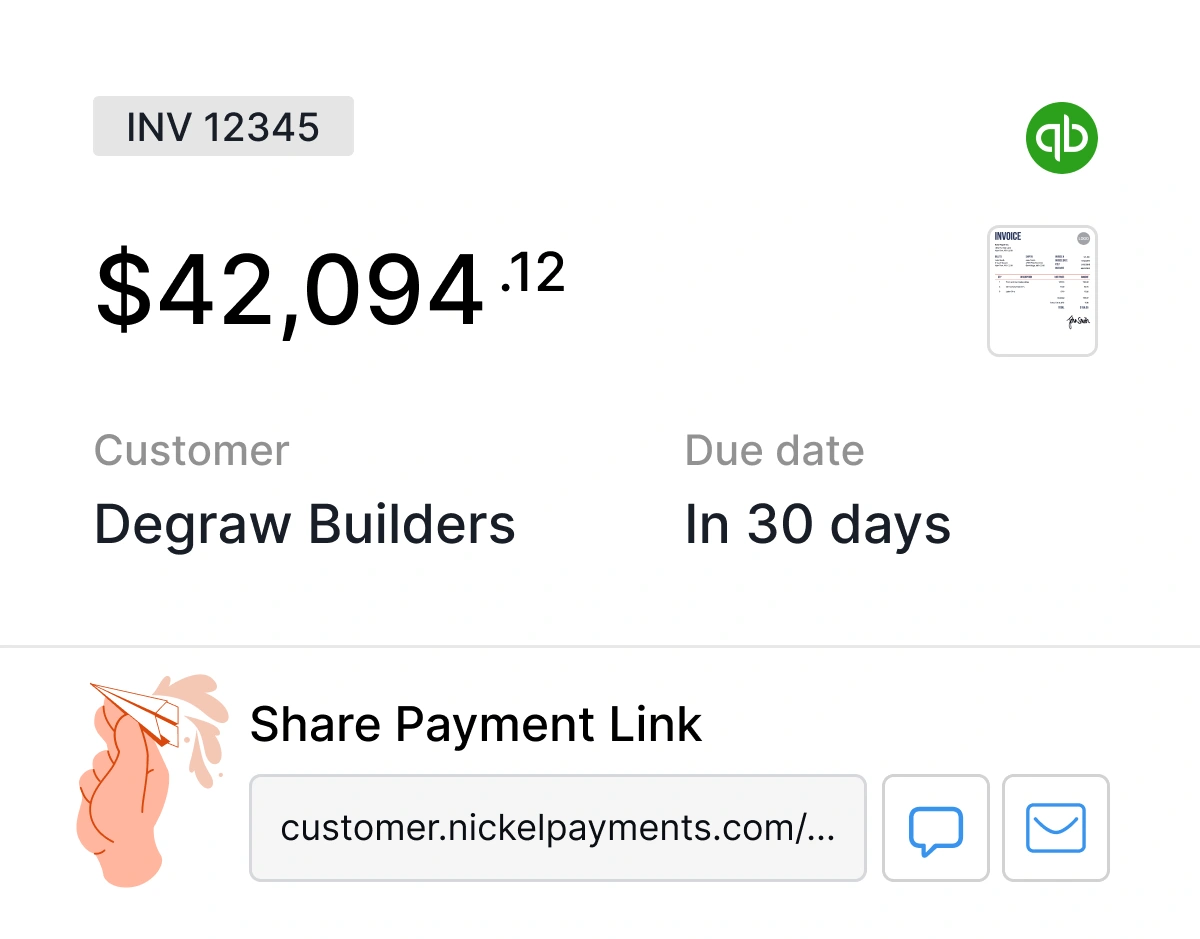The Payment Platform Built for Drywall Contractors
Build up your cash flow with payments that actually work for drywall professionals

Trusted by 10,000+ industrial small businesses














































Why Drywall Contractors Are Switching to Nickel
Unlike traditional payment processors that treat you like a "high-risk" business, Nickel was built specifically for trade professionals who handle large invoice-based transactions. We understand that:
- $25,000 commercial drywall projects are normal business, not suspicious activity
- Job completion clusters create payment surges that banks often flag as unusual
- You need reliable processing during peak construction seasons
- Your cash flow depends on predictable payment timing, not arbitrary holds
Result: No surprise account holds, no "business verification" delays, no risk department calls.

Why Drywall Contractors Are Switching to Nickel
Unlike traditional payment processors that treat you like a "high-risk" business, Nickel was built specifically for trade professionals who handle large invoice-based transactions. We understand that:
- $25,000 commercial drywall projects are normal business, not suspicious activity
- Job completion clusters create payment surges that banks often flag as unusual
- You need reliable processing during peak construction seasons
- Your cash flow depends on predictable payment timing, not arbitrary holds
Result: No surprise account holds, no "business verification" delays, no risk department calls.
Before Nickel vs. After Nickel
Multiple systems for invoicing, payments, and bookkeeping
Banks freeze accounts over routine $25,000 commercial drywall jobs
Lose 1-3% on every transaction ($250-750 per typical job)
Banks don't understand drywall business patterns
Hours spent matching payments to invoices in QuickBooks
Everything integrated: invoicing, payments, and QuickBooks sync
We understand large and variable transactions are normal for drywall contractors and our support team is highly responsive if you ever run into issues
Keep 100% of what customers pay you
Designed around how your business actually works
Your invoices and payments automatically sync to the right customer, service call, and project, plus seamless AP integration
The Cash Flow Crisis Killing Drywall Contractors
The $62.5 billion drywall and insulation industry faces unique financial pressures that generic payment processors simply don't understand. With over 310,000 people employed in the sector and thousands of small contractors competing for work, drywall professionals are caught between rising material costs and increasingly demanding payment terms from general contractors.
Pay-When-Paid Contract Terms:
Most drywall subcontractors work under "pay-when-paid" arrangements with general contractors, meaning they don't receive payment until the GC gets paid by the property owner. This can stretch payment cycles to 60-90 days or longer, forcing contractors to act as involuntary banks for their customers while still covering payroll, materials, and overhead expenses out of pocket.
Material Cost Volatility:
Drywall materials have experienced significant price fluctuations, with gypsum board costs varying based on supply chain disruptions and construction demand. A typical commercial job might require $8,000-15,000 in materials that must be purchased upfront before any payment is received. When material suppliers offer Net 30 terms but contractors wait months for payment, the cash flow gap becomes crushing.
Project Sequencing Dependencies:
Drywall installation depends heavily on other trades completing their work first - electrical, plumbing, and HVAC must be finished before drywall can begin. These dependencies create unpredictable work schedules that make cash flow planning nearly impossible. When upstream delays push your work back weeks, you're still responsible for payroll and fixed costs without incoming revenue.
Seasonal Construction Cycles:
Commercial construction follows predictable seasonal patterns, with most projects starting in spring and finishing before winter. This creates feast-or-famine cash flows where contractors might complete 70% of annual revenue in six months, then struggle through slower winter periods with limited new starts.

The Cash Flow Crisis Killing Drywall Contractors
The $62.5 billion drywall and insulation industry faces unique financial pressures that generic payment processors simply don't understand. With over 310,000 people employed in the sector and thousands of small contractors competing for work, drywall professionals are caught between rising material costs and increasingly demanding payment terms from general contractors.
Pay-When-Paid Contract Terms:
Most drywall subcontractors work under "pay-when-paid" arrangements with general contractors, meaning they don't receive payment until the GC gets paid by the property owner. This can stretch payment cycles to 60-90 days or longer, forcing contractors to act as involuntary banks for their customers while still covering payroll, materials, and overhead expenses out of pocket.
Material Cost Volatility:
Drywall materials have experienced significant price fluctuations, with gypsum board costs varying based on supply chain disruptions and construction demand. A typical commercial job might require $8,000-15,000 in materials that must be purchased upfront before any payment is received. When material suppliers offer Net 30 terms but contractors wait months for payment, the cash flow gap becomes crushing.
Project Sequencing Dependencies:
Drywall installation depends heavily on other trades completing their work first - electrical, plumbing, and HVAC must be finished before drywall can begin. These dependencies create unpredictable work schedules that make cash flow planning nearly impossible. When upstream delays push your work back weeks, you're still responsible for payroll and fixed costs without incoming revenue.
Seasonal Construction Cycles:
Commercial construction follows predictable seasonal patterns, with most projects starting in spring and finishing before winter. This creates feast-or-famine cash flows where contractors might complete 70% of annual revenue in six months, then struggle through slower winter periods with limited new starts.
Simplified Modern Workflow
Send invoice (or use your existing invoicing)
Customer pays instantly via secure link
Payment auto-syncs to QuickBooks
Money hits your account in 2 business days
Built-in QuickBooks Integration
Your payments automatically sync to the right invoice, customer, and job. No more:


Compare: Nickel vs. Other Payment Platforms
What This Means for Your Drywall Business
Save Money
Zero ACH fees: Save $5,000-12,000 per year on a typical drywall business No hidden costs: No setup fees, monthly fees, or surprise charges Early payment discounts: Pay and get paid faster, capture supplier discounts
Save Time
Automated reconciliation: 3+ hours per week saved on bookkeeping Instant invoicing: Send payment links directly from job sites One system: Stop switching between payment apps, banking apps, and QuickBooks
Reduce Risk
Process large payments worry-free: We understand drywall transactions and provide responsive support when needed Predictable processing: Money hits your account in 2 business days Secure payments: Bank-level security without the bank headaches
Drywall Industry Payment Breakdown
The U.S. drywall and insulation contractors industry generates over $62.5 billion in annual revenue, yet cash flow remains the biggest challenge facing contractors in this space. Understanding the financial pressures unique to drywall work helps explain why traditional payment processors fail this industry.
Market Fragmentation:
With approximately 20,000 drywall installation contractors operating nationwide, 89% are small businesses with fewer than 20 employees. These smaller operations lack negotiating power with banks and payment processors, often getting stuck with high fees and restrictive policies designed for different industries. The median annual wage for drywall installers is $58,140, meaning thin margins leave little room for excessive processing fees.
Commercial Project Economics:
Commercial drywall projects typically range from $15,000-50,000 per job, with larger projects reaching six figures. According to the U.S. Bureau of Labor Statistics, demand for drywall installers continues growing due to new construction and home remodeling projects. When customers pay by credit card, processors charge 2.9-3.5% plus transaction fees, eating $435-1,500 directly from already narrow profit margins on typical jobs.
Subcontractor Payment Complexity:
Research shows that 92% of construction companies report customers don't pay on time, creating cascading cash flow problems throughout the supply chain. Drywall contractors often wait 60-90 days for payment while managing their own workforce of hangers, tapers, and finishers who need weekly paychecks. This forces small contractors to finance other people's businesses while struggling to meet their own payroll obligations.
Equipment and Material Financing Challenges:
Professional drywall equipment represents significant capital investment - a complete setup including lifts, sanders, and spray equipment can cost $75,000-150,000. Material costs for gypsum board, compound, and fasteners must be paid Net 30 to suppliers, but customer payments often take 60-120 days. This timing mismatch forces contractors into expensive short-term financing or credit lines just to maintain operations.

Drywall Industry Payment Breakdown
The U.S. drywall and insulation contractors industry generates over $62.5 billion in annual revenue, yet cash flow remains the biggest challenge facing contractors in this space. Understanding the financial pressures unique to drywall work helps explain why traditional payment processors fail this industry.
Market Fragmentation:
With approximately 20,000 drywall installation contractors operating nationwide, 89% are small businesses with fewer than 20 employees. These smaller operations lack negotiating power with banks and payment processors, often getting stuck with high fees and restrictive policies designed for different industries. The median annual wage for drywall installers is $58,140, meaning thin margins leave little room for excessive processing fees.
Commercial Project Economics:
Commercial drywall projects typically range from $15,000-50,000 per job, with larger projects reaching six figures. According to the U.S. Bureau of Labor Statistics, demand for drywall installers continues growing due to new construction and home remodeling projects. When customers pay by credit card, processors charge 2.9-3.5% plus transaction fees, eating $435-1,500 directly from already narrow profit margins on typical jobs.
Subcontractor Payment Complexity:
Research shows that 92% of construction companies report customers don't pay on time, creating cascading cash flow problems throughout the supply chain. Drywall contractors often wait 60-90 days for payment while managing their own workforce of hangers, tapers, and finishers who need weekly paychecks. This forces small contractors to finance other people's businesses while struggling to meet their own payroll obligations.
Equipment and Material Financing Challenges:
Professional drywall equipment represents significant capital investment - a complete setup including lifts, sanders, and spray equipment can cost $75,000-150,000. Material costs for gypsum board, compound, and fasteners must be paid Net 30 to suppliers, but customer payments often take 60-120 days. This timing mismatch forces contractors into expensive short-term financing or credit lines just to maintain operations.
Ranked #1 Easiest to Use Payment Solution by G2
See why Nickel outranks every major competitor, including Forwardly, Melio, and Square
Get Started in Minutes
No contracts. No setup fees. No risk.
Sign Up (2 minutes)
Connect QuickBooks (1 click)
Start Getting Paid (immediately)

Ready to Fix Your Payment Problems?
Stop losing money to fees and time to complicated workflows. Join thousands of contractors who've already made the switch.








